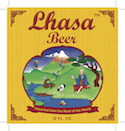Tibet Lhasa Brewery Co.
Lhasa Tibet
Imported by: Dzambuling Imports
El Cerrito, CA
Available: AK, AZ, CA, CO, HI, ID, LA, NM, NV, OK, OR, TX, WA (and soon in AR, IA, KS, MO, MT, NE)
The Tibet Lhasa Brewery Co. is committed to supporting philanthropic efforts in Tibet. Ten percent of the profits and equity from the sale of Lhasa Beer will be directed to education, health care, cultural preservation, environment, vocational training, micro-economic development and disaster relief. Beer was specially formulated to incorporate native Tibetan barley into the production and thereby include local Tibetan farmers in the value chain.
ABV: 4.6
ABW: 3.66
Color: 6.1
Bitterness: 21
Original gravity: 1045

-
Sometimes you just want something light, yellow and fizzy. And if you are going to go that route, Lhasa Beer isn’t a bad choice. This isn’t your typical adjunct beer. It’s an all-malt lager, brewed with Tibetan barley, which, according to marketing documentation, is hull-free and adds to the beer’s body while making it less astringent. I am no expert on Tibetan barley, but I do find this lager’s aroma pleasantly light and sweet. The Saaz hops are surprisingly forward at the first sip, creating a striking balance with a light sweetness from the malt. The Saaz linger long after you swallow, reminding you that this is not your typical American lawnmower beer. Because of the generous dose of hops, Lhasa would hold up at any summer barbecue, and, of course, would be great with Asian or Indian fare.
-
I’d seen some bad reports about this Tibetan beer but, I have to say, if this is all there were to drink at the top of the world, I could get by. I’d put it on a par with a many mainstream lagers―it’s never likely to thrill, but it’ll keep the crowds content. The taste is surprisingly bitter, even though a silky, sweet maltiness lurks in the background. It’s also a little floral and sappy, with a dry, bitter finish that lasts quite well. Exoticism here comes from provenance rather than taste, but there’s really not much to complain about.










